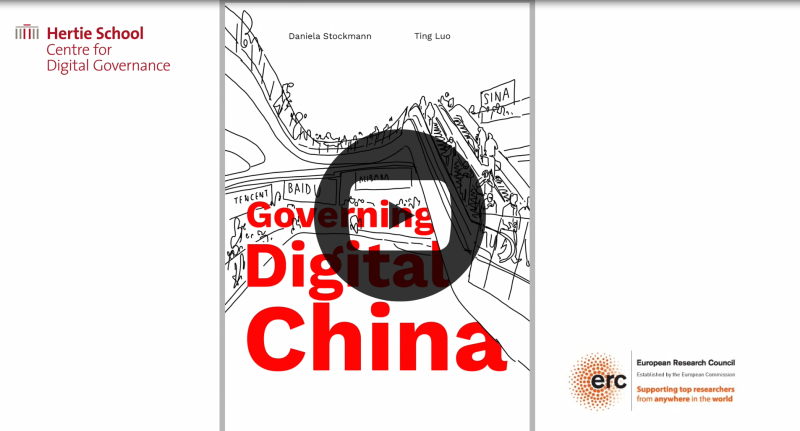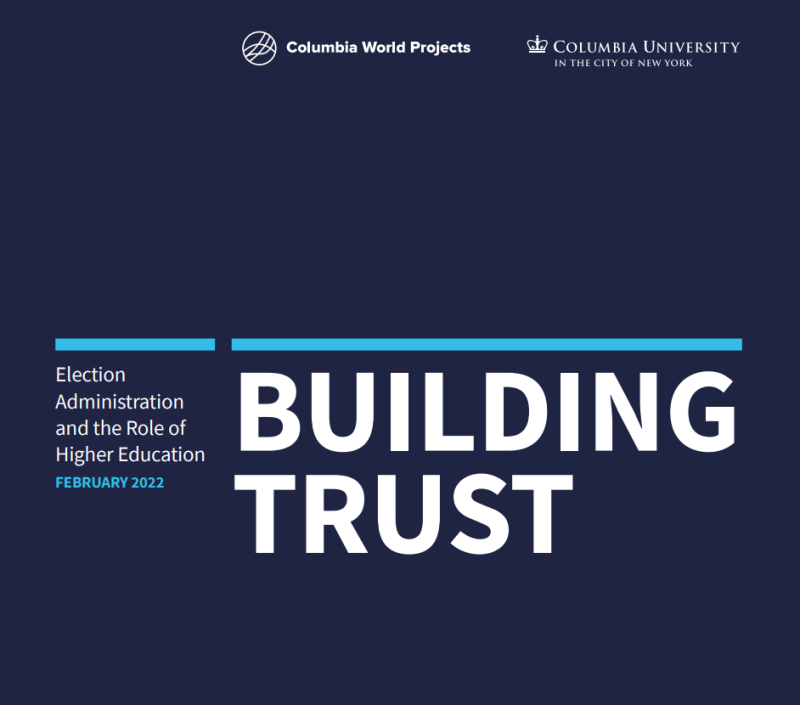Governing Digital China


Columbia World Projects Issues New Report, ‘Building Trust: Election Administration and the Role of Higher Education’
Overview and Background
Columbia World Projects’ (CWP) research and engagement work on democratic renewal explores what sustains and ails liberal democracies around the world and how to revitalize democratic institutions that appear fragile and fraying.
By developing a comparative understanding of the trends and factors that sustain the institutions that undergird democracies, our work identifies new choices that encourage effective problem-solving and civic participation. We work in partnership with government, civic organizations, nonprofits and academic researchers in order to produce reports and develop communities of practice that advocate for and, in some cases, implement recommendations that emerge from our work.
Digital Platform Governance
There are significant harms that arise from the concentrated power of a few very large firms that control technology platforms, thus shaping democratic outcomes, market transactions, information flows, and social life. To address these concerns, this initiative examines prospects for the regulation of digital platforms through two complementary networks. The first, with support from the John S. and James L. Knight Foundation and in partnership with the Center for Digital Governance at the Hertie School, brings together European and United States policymakers, regulators, and researchers with the goal of mutual learning and policy development. A second joins comparable persons in the global south. Both assess opportunities for regulation that preserve and protect democratic processes and institutions while addressing central concerns about firm size, uncurated content, and insecurity. This work is an outgrowth of a past initiative, “Strategic Foresight and Collaboration Between the U.S. and Europe.”
Renewing Parties
This initiative, launched in December 2019, brought together political scientists, historians, legal scholars and political sociologists in working groups, each examining particular features of the party system, which aimed to map what ails political parties and offer concrete ideas for overcoming this failure of contemporary politics.
No successful democracy can thrive without a vibrant, legitimate and effective party system. Successful political parties usually attract support from broad coalitions. Such backing helps parties in office govern effectively by addressing both fundamental long-term challenges and more immediate issues voters view as urgent priorities. Increasingly, parties can be seen to have fallen short both in building sufficiently broad coalitions and in addressing the big questions of the day. These circumstances have produced two distinct trajectories: in some countries, notably including the United States, an ever-deeper and more narrow partisanship; in others, once-dominant parties come to resemble each other more and more, opening the field to formerly peripheral and intensely populist alternatives. Each condition brings with it vexing challenges to policy formulation that require descriptive explanation and solution-minded thinking.
Election Infrastructure
This initiative – which gathers law faculty, political scientists, leaders from grassroots organizations and election officials – focuses on democracy in the United States, and analyzes current barriers to voting, what constitutes a healthy electoral system and how to broadly adopt good practices in service of designing a bipartisan, independent election architecture that increases voter participation and safeguards election integrity. An initial working group within this initiative assessed the high variation of local practices and standards in order to identify fragilities and understand why the election system was able to withstand withering assault by elected officials. The group also explored the legislative, infrastructure, training and personnel moves that enabled the electoral system’s stability. CWP’s report, Building Trust: Election Administration and the Role of Higher Education, captures the group’s recommendations as they relate to how universities might address the trust deficit vexing US elections. The initiative builds upon previous CWP explorations of grassroots voter mobilization efforts and was launched in November 2019, with a convening on models and approaches that could improve voter access.
Barriers and Borders
Territorial boundaries can be external, separating states and empires from each other, or internal, as in federal sovereign units, or both. Human boundaries, which sometimes, but not always, coincide with territorial ones, govern patterns of migration, membership and citizenship, and the social and economic as well as political and symbolic hierarchies of power and difference. In partnership with the Centre for History and Economics at the University of Cambridge, this initiative seeks answers to an urgent question: Under what conditions do boundaries become barriers for people, ideas, and goods that obstruct access, confine within bounds, and bar entry and participation to places or roles reserved only for some under limited conditions? More information on this initiative and publications from past gatherings can be found here.
Previous Initiatives
Fault Lines in Indian Politics
This working group brought together researchers and journalists to explore federalism in the world’s largest democracy. Cooperation between India’s states and its federal government will be crucial to mounting an effective response to rising challenges to Indian democratic institutions, and to addressing core concerns about the country’s governance. This working group identified and proposed to policymakers and legislators means of strengthening institutional mechanisms and platforms for resolving disputes between state and federal government while also exploring the stakes of these disputes. The group’s launch meeting was in October 2019 and considered the fate of India’s constitutional democracy.
Strategic Foresight and Collaboration Between the U.S. and Europe
This initiative emerged from a joint commitment by Klaus Welle, Secretary General of the European Parliament, and Columbia University President Lee C. Bollinger to deepen ties between Columbia University and the European Union. It assessed how these challenges are shaping the agenda for policymakers on both sides of the Atlantic over the coming decade. An initial meeting was held in February 2019. A second meeting, held in January 2021, brought Columbia faculty together with senior EU officials to explore pathways to a sustainable recovery from the COVID-19 pandemic, with a focus on public health, democratic renewal, climate change and economic inequality.

